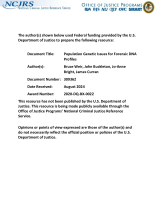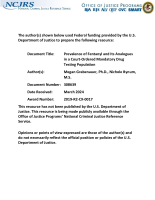Populations
MOSAIC: Unifying Methods of Sex, Stature, Affinity, & Age for Identification through Computational Standardization
What about us? Formative evaluation of forensic nursing program delivery of intimate partner violence medical forensic examinations
Population Genetic Issues for Forensic DNA Profiles - Draft Final Report, January 1, 2021 - June 30, 2023
Understanding the Impact of COVID-19 on Victim Services
The COVID-19 pandemic had a detrimental impact on communities across the nation and significantly affected various aspects of individuals’ lives. One of the negative impacts was an increase in gender-based violence accompanied by shifting barriers to accessing services and support. Victims and victim service providers faced various challenges dealing with the increase in need for services, navigating barriers to help-seeking, and addressing logistical issues.
See the YouTube Terms of Service and Google Privacy Policy




